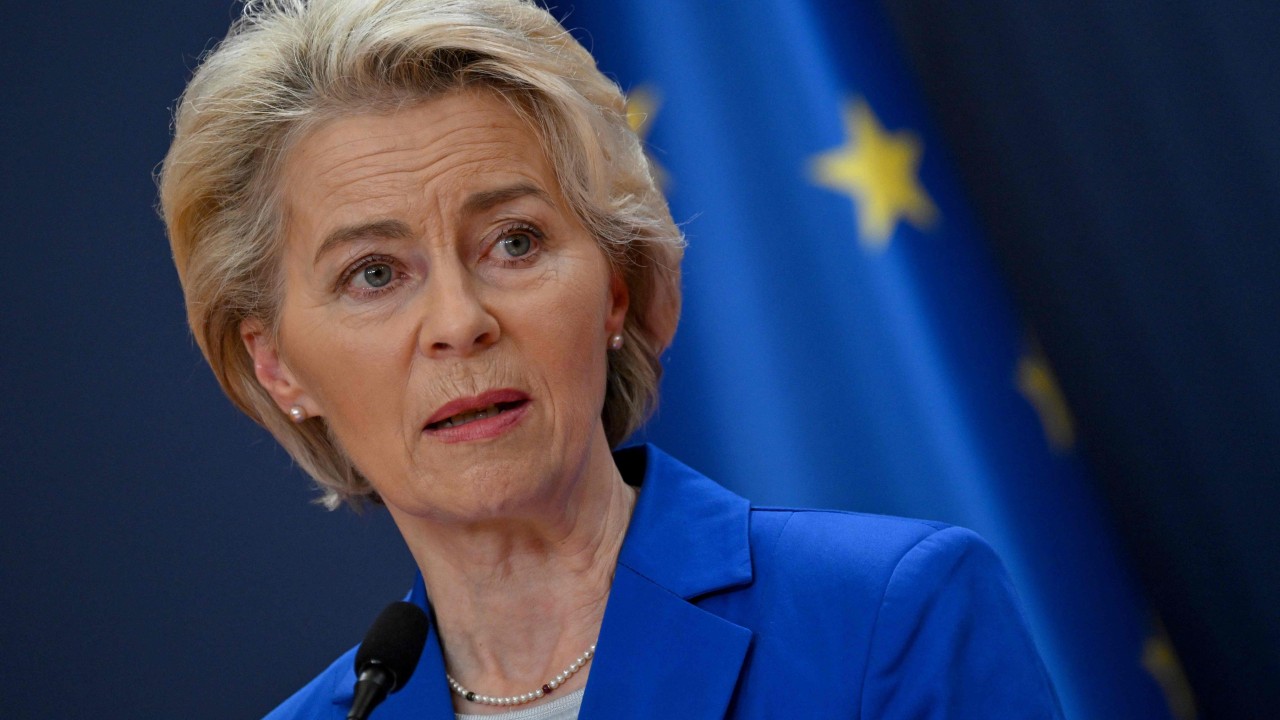EU threatens tougher stance on China as concerns over Beijing’s economic policies grow in build-up to summit
[ad_1]

“We must also be clear-eyed on how China’s global posture is changing. We see a strong push to make China less dependent on the world, and the world more dependent on China. Geopolitics and geoeconomics cannot be seen as separate any more,” von der Leyen said.
While China has pushed back strongly against the idea that Europe is a rival, von der Leyen warned an audience of EU ambassadors in Brussels: “We must recognise that there is an explicit element of rivalry in our relationship.
“The Chinese Communist Party’s clear goal is a systemic change of the international order, of course with China at its centre. We have seen it with China’s positions in multilateral bodies, which show its determination to promote an alternative vision of the world order.”
EU needs better understanding of China, says ex-Spanish foreign minister
EU needs better understanding of China, says ex-Spanish foreign minister
Von der Leyen – who is expected to secure a second term as commission chief next year – acknowledged that China is “our most important trading partner in terms of goods”, but accused Beijing of failing to play by the rules of international trade.
“Concerns about unfair and at times predatory practices distorting our own single market are absolutely tangible and rising – measurable. For instance, China has often resorted to trade coercion, boycotts of European goods, and export controls on critical raw materials,” she said.
Speaking at the same event, the EU’s top diplomat Josep Borrell raised the spectre of a trade war with Beijing, panning the “abysmal trade deficit” and warning that it “will be difficult for China to maintain its access to the European market at a time when European companies are finding it increasingly difficult to work in China”.
He added: “If China continues to deny the reality and consequences of this imbalance, it runs the risk of seeing a rising demand in Europe for more protection. We are not protectionist, but maybe we have to protect ourselves. If China does not open, maybe we will have to close.”
Some elements in Brussels want further probes into medical devices and wind turbines. Although sources have said there is not enough evidence to move on the latter immediately, the current rhetoric means such moves would be no surprise.
European businesses are eyeing the situation warily – but warned Chinese authorities that they too are fed up with the situation.
“It’s a little bit ironic that China expresses concerns about the European discussion on de-risking, because China has been de-risking for the past decade,” president of the EU Chamber of Commerce in China Jens Eskelund said in an interview during a recent trip to Brussels.
‘Illogical’: China’s former envoy to EU hits back at Josep Borrell speech
‘Illogical’: China’s former envoy to EU hits back at Josep Borrell speech
Eskelund said that businesses have a “clear line of sight” of massive overcapacity in critical sectors of the Chinese economy – ranging from automotives, to solar panels, wind turbines, chemicals and metals – warning Beijing that continuing to “externalise” that capacity in the form of cheap exports will ratchet up trade tensions.
For example, Eskelund said, China has the capacity to produce 50 million cars while there is only domestic demand for 23 million units. He also pointed to “big discrepancy” between a production capacity of 100GW and domestic demand of 47GW for wind-powered energy.
“I am nervous that on current trajectory we will see much more of this. I’m afraid that sparks will fly in 2024 and that’s the reason we say we need to talk about it now, before things get out of hand,” he said.
Survey data released this week showed the extent of concern among European businesses operating in China.
China’s Dutch imports soar in sign of ASML kit stockpiling
China’s Dutch imports soar in sign of ASML kit stockpiling
The European Central Bank quizzed 65 EU multinationals to find that de-risking strategies dominate their plans for the next five years. Almost two-thirds of respondents said dependency on China posed significant risk to supply chains, with the United States a distant second on 12 per cent.
Of those companies sourcing from China, 42 per cent said they would start to look for suppliers closer to home, a trend known as “friend-shoring”, compared with just 9 per cent over the previous five years.
However, while companies may fret about the risks of doing business in the world’s second largest economy, doing something about it may prove to be more difficult. Some 94 per cent of respondents said it would be “hard” or “very hard” to source substitute inputs for their products.
[ad_2]
Source link





